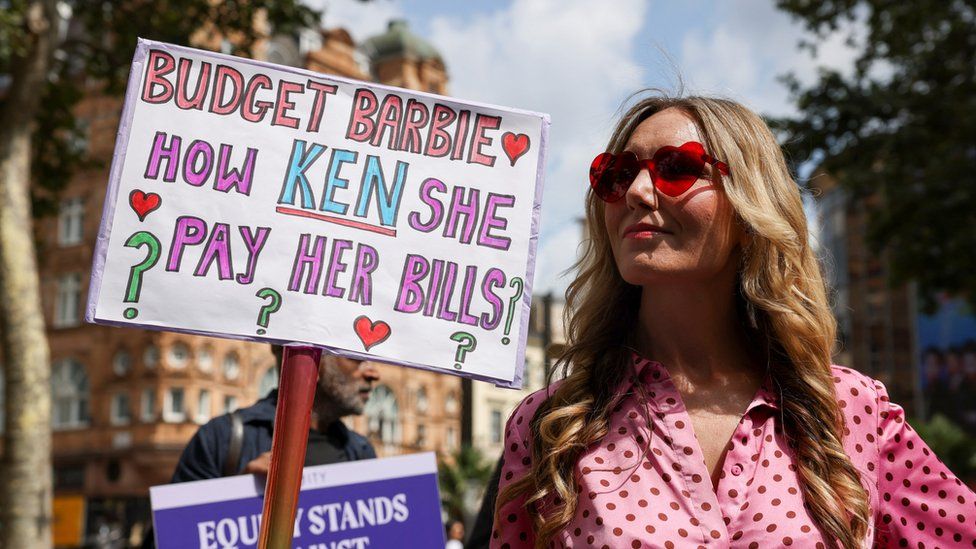After almost five months, a tentative deal between writers and studio executives could end a strike that has halted most film and TV production.
The Writers Guild of America (WGA) called the agreement “exceptional – with meaningful gains and protections for writers”.
But with the actors’ strike continuing, a ripple effect is still being felt across the UK film industry.
Workers have struggled to pay rent and some small businesses have shut down.
Alongside issues around pay, actors and writers are fearful of the potential impact of artificial intelligence replacing their talents and expertise.
The dispute has shut down many of America’s top programmes and film productions, but a knock on effect has been felt across the industry in the UK.
Bectu, the British union for workers in behind-the-scenes roles in creative industries, surveyed 4000 of its members and 80 percent said their jobs had been affected, with three-quarters not working at all.
In 2019, the UK film industry contributed £12.6 billion to the UK economy.

Another lockdown
Filmmaker and camera operator Rizwan Wadan has compared the recent halt in production to another lockdown for industry workers.
“After the Covid lockdown we had a bottleneck of productions and there was a boom. Everyone was busy.”
“Now, because of the strikes, it has come to another lockdown.”
Rizwan added that a number of rental houses where equipment is hired have had to close down because of the lack of equipment requests and others have moved down to four-day working weeks.
He said the lack of financial investment from the US has also stifled talent development in the industry.
“We are recognised for the UK talent and infrastructure” he said, “but amazing freelancers and trainees can’t enter the industry at the moment either.”
Rizwan still has hope that there will be a light at the end of the tunnel once all of the strikes are over, and believes the industry will experience “another boom” in production because of a new bottleneck in production.

‘We seem to be forgotten about’
Dave Sullivan is a set and prop designer who has previously worked on large franchises like Star Wars and Harry Potter.
He says as far as the industry is concerned, the current situation is “absolutely catastrophic”.
“We support our brothers and sisters in the industry but we have to draw the line somewhere. It’s completely ground to a halt and the unions aren’t doing enough.
“We seem to be forgotten about. It is quite distressing really.”
He adds: “The cost of living crisis and pandemic was bad enough. Thankfully the pandemic was over to a certain extent and we were getting back on track again.
“When you go from earning a relatively good salary to nothing overnight you can imagine the impact it will have on a family. People are losing their houses.”
Asked if he is concerned about the impact of artificial intelligence potentially damaging the industry and its employees, Dave said AI was “an inevitable part of the future of the film industry”.
“AI needs to be used as a tool to make production better, but we can’t forget the people that already work in the industry and throw them in the bin.”

‘Creativity isn’t on strike’
Ana Mulvoy Ten, a British actress currently living in Los Angeles, has come back to the UK in search of work while the Hollywood strikes go on.
She says the general view of the Hollywood lifestyle is distorting the true picture.
“The glitz and glamour of Hollywood overshadows the reality of what life looks like for most SAG actors,” she said.
“What we see on TV in terms of Hollywood is that it’s just people making millions, that it’s all just fun and games all the time, and everyone’s living this fabulous life.
“This may be true for a handful, but I think that the majority of people aren’t living like that. 86% of SAG members can’t get health insurance.”
She adds that it is the creatives behind the scenes who are really struggling.
“It’s hair and make-up people being hit hardest. Crews, lighting, sound and caterers. It’s not just people who are in designer clothes walking red carpets.”

She went on to say industry worker will ultimately persevere, because “creativity isn’t on strike.”
“They’ll come back and they’ll make more things and they’ll be even better.
“I don’t think anybody actually knows when it will be over, but the hope is that they come to an agreement… and that everybody can go back to work on great projects doing what they love.
“Mainly it’s about everyone feeling like they are not just completely disregarded.”
UK film and TV union Bectu has called the recent tentative writers’ deal “welcome news” for its members and the UK film and TV industry as a whole.
In a statement, Bectu’s head, Philippa Childs, said “UK crew and other workers have suffered at the hands of the AMPTP’s (Alliance of Motion Picture and Television Producers) failure to reach an acceptable agreement with WGA and SAG-AFTRA, and this news will provide some hope after months of instability.
The statement goes on to say: “It’s now critical that the AMPTP directs all its energies into resolving the dispute with our SAG-AFTRA colleagues.”
